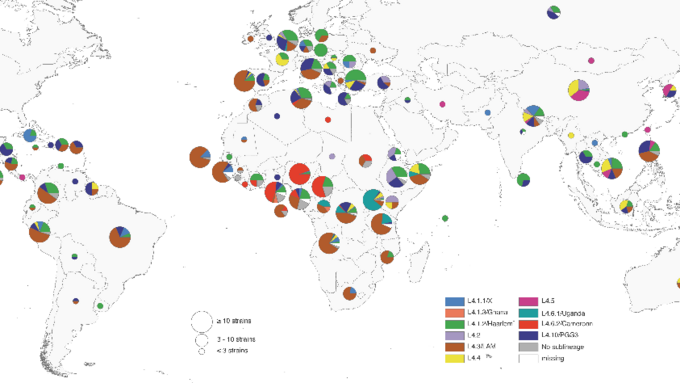Tuberculosis bacteria find their ecological niche
01.11.2016
Researchers at the Swiss Tropical and Public Health Institute (Swiss TPH) and the University of Basel have isolated and analyzed genetically tuberculosis bacteria from several thousand patients from over a hundred countries. This analysis demonstrates that the tuberculosis bacteria vary in their ecological niche. Whereas the so-called generalists occur all around the world, the specialists are only found in certain geographical regions. This finding, published today in the renowned journal Nature Genetics, could further complicate the development of novel tuberculosis vaccines.

Tuberculosis (TB) has been a feared companion of humankind since prehistory. Various TB bacterial strains exist globally, with different geographical spread. Only the so-called Lineage 4 occurs on all continents. It is responsible for the majority of the 10 million new infections and 2 million deaths annually.
Under the lead of Sébastien Gagneux at Swiss TPH, a team of 75 scientists at 56 institutions analyzed the genetic make-up of TB bacteria from several thousand patients. Surprisingly, it was found that Lineage 4 can be genetically further subdivided into several sublineages. Some of these sublineages occur all over the world, others are geographically highly restricted. According to the study in the journal Nature Genetics, TB bacteria can be divided into generalists with worldwide distribution and specialists that have focused on localized ecological niche. While ecologists have been differentiating between generalists and specialists, especially in plants, for a pathogenthat transmits exclusively from human to human, such a subdivision is new.
Generalists are immunologically more versatile than specialists
TB bacteria have a unique property: they hardly vary their antigens, and are thus efficiently recognized by the human immune system. As a result, a fierce immune reaction occurs, which affects the lungs in particular, and promotes coughing. Thanks to this strategy, TB bacteria is transmitted very efficiently from human to human.
Sébastien Gagneux and his team show that the generalists pursue an additional strategy. They show a slightly increased diversity of their antigens compared to the specialists. Generalists are thus able to react more specifically to the immune system of different human populations. “Generalists have adapted their molecular strategy,” says Sébastien Gagneux. “They are able to push through and spread much more globally.”
Implications for vaccine development
These new findings have implications for the development of new TB vaccines. The more TB bacteria can adapt their antigens, the more difficult it will be to design a vaccine that is equally effective in all human populations across the world. Hence, the development of a broadly active TB vaccine might be delayed even further.
Stay connected
Subscribe to our newsletter and get all the latest research news, project updates, course and event listings from Swiss TPH.